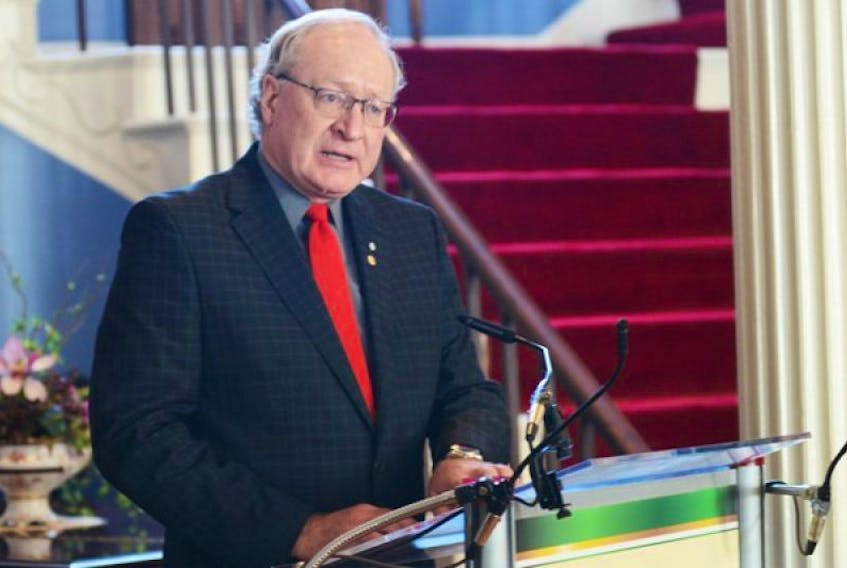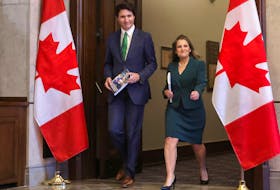Just say no, Mr. Premier. We already pay enough taxes. We can’t afford any more. Don’t fall into the trap of making draconian spending cuts while also raising taxes — just to balance the budget.
As Kevin Lacey, Atlantic director of the Canadian Taxpayers’ Federation argued Tuesday, raising taxes in a tough New Brunswick budget is not the way to grow the economy. Tax increases are counterproductive.
But N.B. did just that, raising its HST two points to 15 per cent.
We may never know when the deal was formally struck, but it seems November 6, 2015, in Charlottetown is the likely winner. In the giddy days immediately after the October 19 federal election, when 32 Liberal MPs swept to victory in Atlantic Canada, the three Maritime Liberal premiers met in Charlottetown.
The red tide which swept Atlantic Canada federally was about to also engulf Newfoundland and Labrador provincially.
It’s likely the three premiers discussed how they were going to handle harsh spring budgets and their plans for possible HST harmonization.
The P.E.I. Opposition issued warnings the past week about an imminent HST increase here. Nova Scotia Premier Stephen McNeil was making public comments in support of harmonizing the region’s HST rate and it didn’t take long for the Opposition to take its cue.
New Brunswick did its part Tuesday to match the Nova Scotia rate of 15 per cent. The pressure is now on Prince Edward Island to follow suit and increase its rate from 14 to 15 per cent. P.E.I. Premier Wade MacLauchlan is being pressured to join the 15 per cent club in April when the provincial budget is brought down. There are incentives for the premier to follow his Maritime counterparts as a HST increase would be an immediate cash cow.
N.B. Premier Brian Gallant is desperate for revenue and the HST hike will generate an additional $300 million a year but the province will still run a deficit of $347 million this fiscal year. The N.B. budget was termed a tax and spend document with a side order of cuts which doesn’t achieve a whole lot at the end of the day.
P.E.I. can take a more balanced and cautious approach by holding the line on tax increases while tightening spending controls to keep the province attractive for investment and job creation. Raising taxes means less disposable income to purchase retail products. It would be a mistake.
P.E.I. doesn’t have to follow the N.B. lead, no matter what was promised last November.
The P.E.I. government hopes to balance its budget for the coming fiscal year. It’s a laudable goal but not at the cost of tax increases which places an added burden on residents. Don’t try and balance the budget on the backs of over-taxed Islanders.
Mr. McNeil suggests that increasing the HST makes sense for businesses and streamlines economic co-operation. Maybe it does for N.S. which has had the 15 per cent rate for some time. It makes sense for N.S. but it doesn’t make sense for P.E.I. which now enjoys a competitive advantage.
The federal government will soon invest billions in infrastructure to stimulate the economy, so why are the provinces intent on moving in the opposite direction?
The Liberal win federally and the party holding power in all Atlantic Canada was supposed to offer an opportunity to work closer together. This isn’t happening.
N.B. tabled the year’s first budget in Canada and it is viewed as a prototype austerity document that sets the tone for what is to come nationwide. It doesn’t have to be this way.
Stimulus spending worked well for the Canadian economy in 2008 with a worldwide recession gaining steam. With growth prospects decreasing for 2016, why are the provinces moving in the wrong direction?
A Toronto bank economist applauds the N.B. budget plan as reasonable.
It is if you’re living in Toronto. But for taxpayers in Cap Pele, N.B., the budget is a huge burden.
Just say no, Mr. Premier. We already pay enough taxes. We can’t afford any more. Don’t fall into the trap of making draconian spending cuts while also raising taxes — just to balance the budget.
As Kevin Lacey, Atlantic director of the Canadian Taxpayers’ Federation argued Tuesday, raising taxes in a tough New Brunswick budget is not the way to grow the economy. Tax increases are counterproductive.
But N.B. did just that, raising its HST two points to 15 per cent.
We may never know when the deal was formally struck, but it seems November 6, 2015, in Charlottetown is the likely winner. In the giddy days immediately after the October 19 federal election, when 32 Liberal MPs swept to victory in Atlantic Canada, the three Maritime Liberal premiers met in Charlottetown.
The red tide which swept Atlantic Canada federally was about to also engulf Newfoundland and Labrador provincially.
It’s likely the three premiers discussed how they were going to handle harsh spring budgets and their plans for possible HST harmonization.
The P.E.I. Opposition issued warnings the past week about an imminent HST increase here. Nova Scotia Premier Stephen McNeil was making public comments in support of harmonizing the region’s HST rate and it didn’t take long for the Opposition to take its cue.
New Brunswick did its part Tuesday to match the Nova Scotia rate of 15 per cent. The pressure is now on Prince Edward Island to follow suit and increase its rate from 14 to 15 per cent. P.E.I. Premier Wade MacLauchlan is being pressured to join the 15 per cent club in April when the provincial budget is brought down. There are incentives for the premier to follow his Maritime counterparts as a HST increase would be an immediate cash cow.
N.B. Premier Brian Gallant is desperate for revenue and the HST hike will generate an additional $300 million a year but the province will still run a deficit of $347 million this fiscal year. The N.B. budget was termed a tax and spend document with a side order of cuts which doesn’t achieve a whole lot at the end of the day.
P.E.I. can take a more balanced and cautious approach by holding the line on tax increases while tightening spending controls to keep the province attractive for investment and job creation. Raising taxes means less disposable income to purchase retail products. It would be a mistake.
P.E.I. doesn’t have to follow the N.B. lead, no matter what was promised last November.
The P.E.I. government hopes to balance its budget for the coming fiscal year. It’s a laudable goal but not at the cost of tax increases which places an added burden on residents. Don’t try and balance the budget on the backs of over-taxed Islanders.
Mr. McNeil suggests that increasing the HST makes sense for businesses and streamlines economic co-operation. Maybe it does for N.S. which has had the 15 per cent rate for some time. It makes sense for N.S. but it doesn’t make sense for P.E.I. which now enjoys a competitive advantage.
The federal government will soon invest billions in infrastructure to stimulate the economy, so why are the provinces intent on moving in the opposite direction?
The Liberal win federally and the party holding power in all Atlantic Canada was supposed to offer an opportunity to work closer together. This isn’t happening.
N.B. tabled the year’s first budget in Canada and it is viewed as a prototype austerity document that sets the tone for what is to come nationwide. It doesn’t have to be this way.
Stimulus spending worked well for the Canadian economy in 2008 with a worldwide recession gaining steam. With growth prospects decreasing for 2016, why are the provinces moving in the wrong direction?
A Toronto bank economist applauds the N.B. budget plan as reasonable.
It is if you’re living in Toronto. But for taxpayers in Cap Pele, N.B., the budget is a huge burden.









